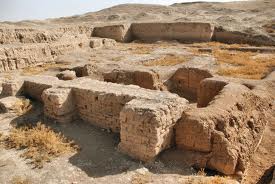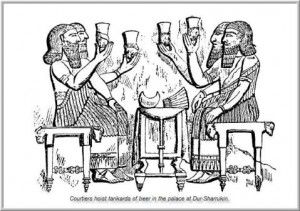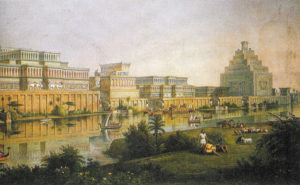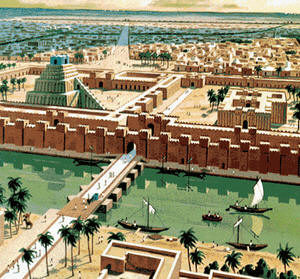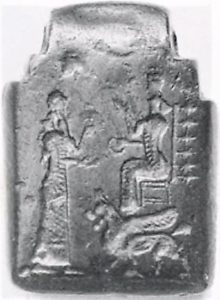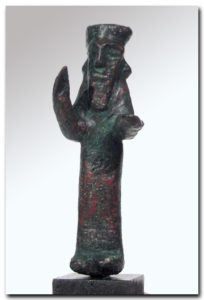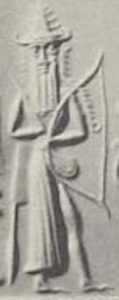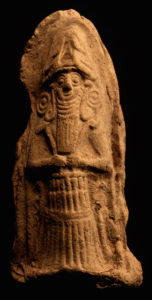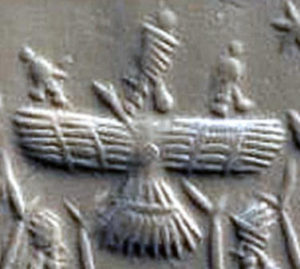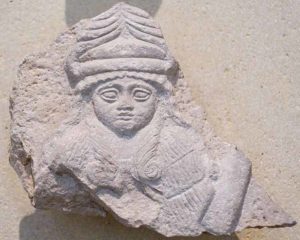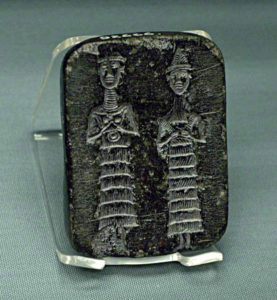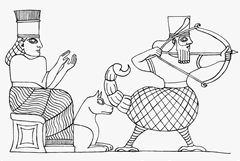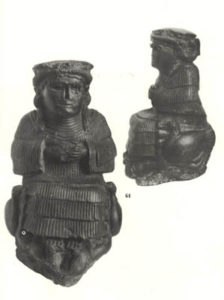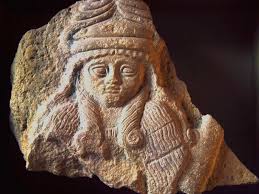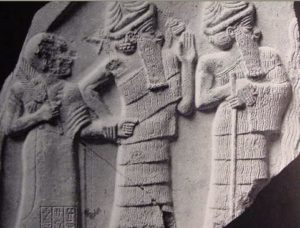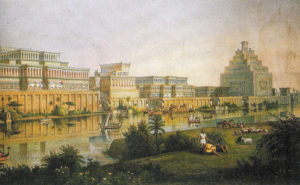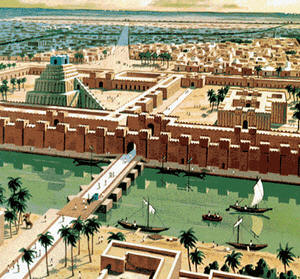The Electronic Text Corpus of Sumerian Literature
(Texts: All Artifacts, Color Coding, & Writings in Bold Type With Italics Inside Parenthesis, are Added by Editor R. Brown, not the Authors, Translators, or Publishers!)
(gods in blue …mixed-breed demigods in teal…)
1-4 On the day when in heaven and earth the fates had been decided, Lagac (Lagash) raised its head high in full grandeur,
and Enlil looked at lord Nin-jirsu (Ninurta, Enlil‘s son) with approval.
In our city there was perfection.
5-9 The heart overflowed with joy, Enlil‘s heart, a river in flood, overflowed with joy.
The heart overflowed with joy, and just as the Tigris brings sweet water,
so Enlil, whose will is an enormous flood, sparkling and awe-inspiring, came to a sweet decision:
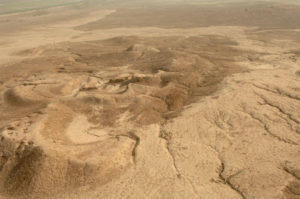 (Lagash ruins with Ninurta‘s E-ninnu zigurat-residence)
(Lagash ruins with Ninurta‘s E-ninnu zigurat-residence)
10-16 ‘The lord called for his house and I intend to make the grandeur of E-ninnu known everywhere.
Using his wisdom, the ruler will achieve great things.
He will direct faultless cattle and kids for offering.
It is for him the fated brick is waiting.
It is by him that the building of the house is to be done.´
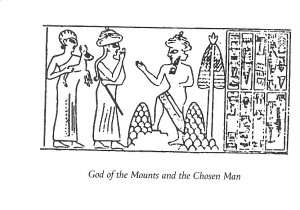 (mixed-breed king Gudea, mother goddess Ninsun, & Ninurta)
(mixed-breed king Gudea, mother goddess Ninsun, & Ninurta)
17-23 On that day, in a nocturnal vision Gudea saw his master, lord Nin-jirsu.
Nin-jirsu (Ninurta) spoke to him of his house, of its building.
He showed him an E-ninnu with full grandeur.
Outstanding though his mind was, the message remained to be understood for him.
24-32 ´Well, I have to tell her about this! Well, I have to tell her about this.
I will ask her to stand by me in this matter.
Profound things (?) came suddenly to me, the shepherd,
but the meaning of what the nocturnal vision brought to me I do not understand.
So I will take my dream to my mother and I will ask my dream-interpreter, an expert on her own,
my divine sister from Sirara (temple complex in Lagash), to reveal its meaning to me.´
33-38 He stepped aboard his boat, directed it on the canal Id-Nijin-dua towards her city Nijin (Bau‘s city Isin),
and merrily cut through the waves of the river.
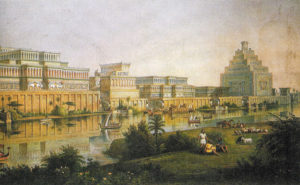 (Ninurta‘s patron city of Lagash, along the Tigris River)
(Ninurta‘s patron city of Lagash, along the Tigris River)
After he had reached Bagara, the house extending as far as the river,
he offered bread, poured cold water and went to the master of Bagara to pray to him.

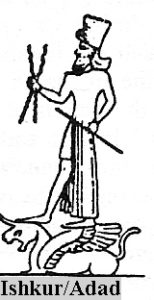 (Ninurta, Enlil‘s eldest son & heir; Ninurta riding his winged beast)
(Ninurta, Enlil‘s eldest son & heir; Ninurta riding his winged beast)
39-51 ´Warrior, rampant lion, who has no opponent!
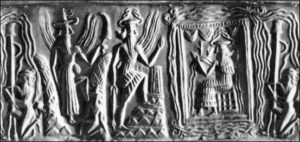
(Utu & Ninurta climb Eridu ziggurat to visit Enki at home in the abzu / marshlands)
Nin-jirsu, important in Abzu (marshlands of Persian Gulf), respected in Nibru (Nippur, named after their planet Nibiru)!
Warrior, I want to carry out faithfully what you have commanded me;
Nin-jirsu, I want to build up your house for you, I want to make it perfect for you, so I will ask your sister,
the child born of Eridu (Enki), an authority on her own, the lady,
the dream-interpreter among the gods (Goddess of Persian Gulf Birds & Fishes)
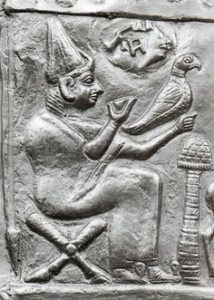
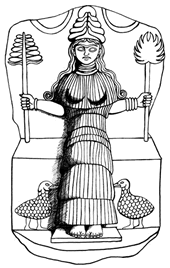 (Enki gave daughter Nanshe authority of Persian Gulf birds & fishes)
(Enki gave daughter Nanshe authority of Persian Gulf birds & fishes)
my divine sister from Sirara, Nance (Enki‘s & Ninhursag‘s daughter via Uttu), to show me the way.´
His call was heard; his master, Lord Nin-jirsu accepted from (King) Gudea his prayer and supplication.
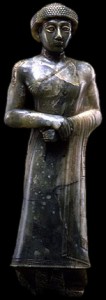
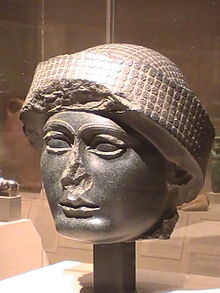 (Gudea, Ninsun‘s giant mixed-breed son-king of Lagash)
(Gudea, Ninsun‘s giant mixed-breed son-king of Lagash)
52-63 Gudea celebrated the ecec festival in the house of Bagara.
The ruler set up his bed near to Jatumdug (Ninsun).
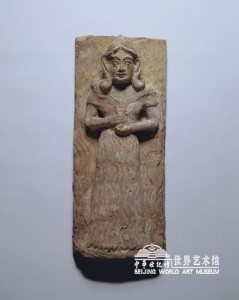 (Ninsun / Jatumdug, Ninurta‘s daughter, Gudea‘s mother)
(Ninsun / Jatumdug, Ninurta‘s daughter, Gudea‘s mother)
He offered bread and poured cold water and went to holy Jatumdug to pray to her:
´My lady, child begotten by holy (Bau) An, an authority on her own, proud goddess, living in the Land, …… of her city.
Lady, mother, you who founded Lagac if you but look upon your people,
it brings abundance; the worthy young man on whom you look will enjoy a long life.
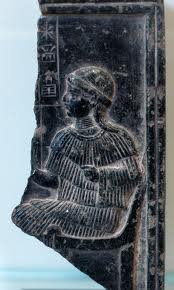 (Ninsun, mother of many mixed-breed son-kings & some alien giant gods)
(Ninsun, mother of many mixed-breed son-kings & some alien giant gods)
64-67 ´For me, who has no mother, you are my mother; for me, who has no father, you are my father.
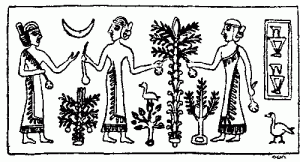
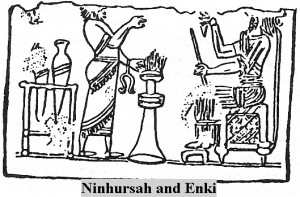 (alien lab)
(alien lab)
You implanted my semen in the womb (alien technologies), gave birth to me in the sanctuary,
Jatumdug (Ninsun), sweet is your holy name!
68-79 ´Tonight I shall lie down here (?).
You are my great dagger (?), being attached to my side; you are a …… planted in great waters, providing me with life;
you are a broad sunshade; let me cool off in your shade.
May the favorable, right-hand palm of your lofty hands, my lady Jatumdug, lend me protection!
I am going to the city, may my sign be favorable!
May your friendly guardian go before me, and may your friendly protecting genius walk with me
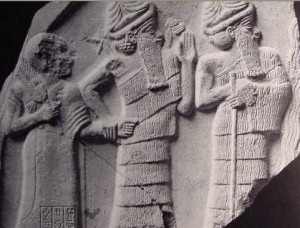
(Ninsun‘s son Gudea, Enki‘s giant son Ningishzidda, & Ninsun‘s & Enki‘s giant son Dumuzi, brothers assist mixed-breed king Gudea)
on the way towards Nijin (Isin), the mountain rising from the water.
80-89 ´Well, I have to tell her about this! Well, I have to tell her about this.
I will ask her to stand by me in this matter.
I will take my dream to my mother and I will ask my dream-interpreter, an expert on her own,
my divine sister from Sirara, Nance (Enki‘s daughter), to reveal its meaning to me.´
His call was heard; his lady, holy Jatumdug, accepted from Gudea his prayer and supplication.
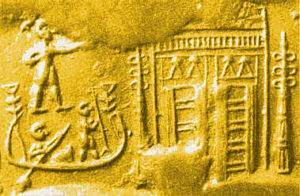 (giant mixed-breed king & earthlings moor the boat by the ziggurat entrance)
(giant mixed-breed king & earthlings moor the boat by the ziggurat entrance)
90-100 He stepped aboard his boat, directed it towards her city Nijin, mooring it at the quay of Nijin (Bau‘s city Isin).
The ruler raised his head high in the courtyard of the goddess from Sirara.
He offered bread, poured cold water and went to Nance to pray to her:
´Nance, mighty lady, lady of most precious (?) powers, lady who like Enlil determine fates,
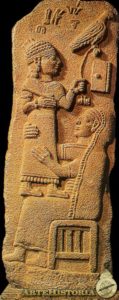 (giant alien goddess Nanshe, Enki‘s scientist-goddess over birds & fishes, fish or pelicans are used to symbolize her)
(giant alien goddess Nanshe, Enki‘s scientist-goddess over birds & fishes, fish or pelicans are used to symbolize her)
my Nance, what you say is trustworthy and takes precedence.
You are the interpreter of dreams among the gods, you are the lady of all the lands.
Mother, my matter today is a dream:
101-109 ´In the dream there was someone who was as enormous as the heaven, who was as enormous as the earth.
 (Ninurta‘s winged storm-bird / sky-disc, armed for areal battles)
(Ninurta‘s winged storm-bird / sky-disc, armed for areal battles)
His head was like that of a god, his wings were like those of the Anzud bird, his lower body was like a flood storm.
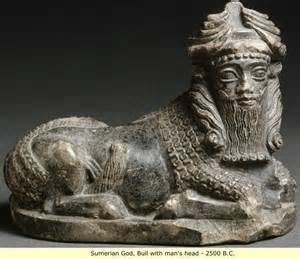 (Ninurta as a lion sphinx guarding gates of Lagash)
(Ninurta as a lion sphinx guarding gates of Lagash)
Lions were lying at his right and his left.
He spoke to me about building his house, but I could not understand what he exactly meant,
then daylight rose for me on the horizon.
110-114 ´Then there was a woman – whoever she was.
She …… sheaves.
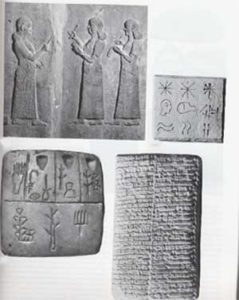 (giant goddesses, scribes to the 1st written texts on Earth, discovered in Mesopotamia)
(giant goddesses, scribes to the 1st written texts on Earth, discovered in Mesopotamia)
She held a stylus of refined silver in her hand, and placed it on a tablet with propitious stars, and was consulting it.
115-123 ´There was, furthermore, a warrior.
His arm was bent, holding a lapis lazuli tablet in his hand, and he was setting down the plan of the house.
The holy basket stood in front of me, the holy brick mold was ready and the fated brick was placed in the mold for me.
In a fine ildag tree standing before me tigidlu birds were spending the day twittering.
My master´s good donkey was pawing the ground for me.´
124-131 His mother Nance answered the ruler:
´My shepherd, I will explain your dream for you in every detail.
The person who, as you said, was as enormous as the skies,
who was as enormous as the earth, whose head was like that of gods,
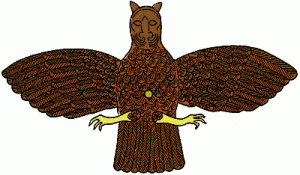
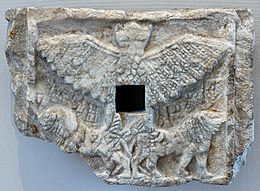
whose wings, as you said, were like those of the Anzud bird, and whose lower body was, as you said,
like a flood storm, at whose right and left lions were lying, was in fact my brother (cousin) Nin-jirsu.
He spoke to you about the building of his shrine, the E-ninnu.
132-133 ´The daylight that had risen for you on the horizon is your personal god Ningiczida (Ningishzidda),
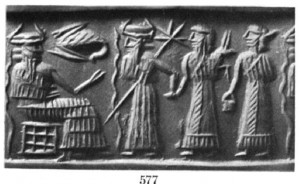 (Enki, Ningishzidda, & a shepherd-king with spouse)
(Enki, Ningishzidda, & a shepherd-king with spouse)
who will rise for you as the daylight on the horizon.
134-140 ´The young woman …… sheaves, who held a stylus of refined silver in her hand,
who had placed it on a tablet with propitious stars and was consulting it, she was in fact my sister Nisaba.
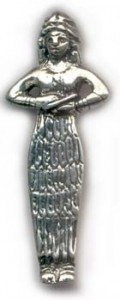 (Nisaba, Enlil‘s mother-in-law, Master Scribe for gods & earthlings, goddess of grains)
(Nisaba, Enlil‘s mother-in-law, Master Scribe for gods & earthlings, goddess of grains)
She announced to you the holy stars auguring the building of the house.
141-143 ´The second one, who was a warrior and whose arm was bent, holding a lapis lazuli tablet in his hand,
was Nin-dub (Ninurta‘s architect), putting the plan of the house on the tablet.
144-146 ´As regards the holy basket standing in front of you,
the holy brick mold which was ready and the fated brick placed in the mold,
this part of the dream concerns the good brick (fired brick) of the E-ninnu.
147-149 ´As regards the fine ildag tree standing before you, in which, as you said, tigidlu birds were spending the day twittering,
this means that the building of the house will not let sweet sleep come into your eyes.
150-151 ´As regards that part when the right donkey stallion of your master, as you said, pawed the ground for you;
this refers to you, who will paw the ground for the E-ninnu like a steed.
152-172 ´Let me advise you and may my advice be taken.
Direct your steps to Jirsu, the foremost house of the land of Lagac, open your storehouse up and take out wood from it;
build (?) a chariot for your master and harness a donkey stallion to it; decorate this chariot with refined silver and lapis lazuli
and equip it with arrows that will fly out from the quiver like sunbeams, and with the an-kara weapon, the strength of heroism;
fashion for him his beloved standard and write your name on it, and then enter before the warrior who loves gifts,
before your master lord Nin-jirsu in E-ninnu–the–white–Anzud-bird, (alien aircraft)
together with his beloved balaj drum Ucumgal-kalama, his famous instrument to which he keeps listening.
Your requests will then be taken as if they were commands; and the drum will make the inclination of the lord –
which is as inconceivable as the heavens – will make the inclination of Nin-jirsu, the son of Enlil,
favorable for you so that he will reveal the design of his house to you in every detail.
With his powers, which are the greatest, the warrior will make the house thrive (?) for you.´
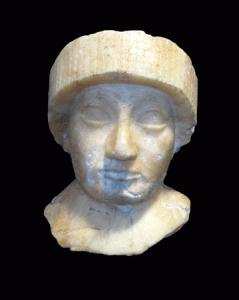 (Gudea, son-king to goddess-mother Ninsun)
(Gudea, son-king to goddess-mother Ninsun) 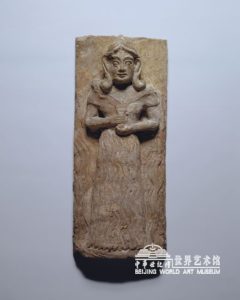
173-195 The true shepherd Gudea is wise, and able too to realize things.
Accepting what Nance had told him, he opened his storehouse up and took out wood from it.
Gudea checked (?) the wood piece by piece, taking great care of the wood.
He smoothed mes wood, split halub wood with an ax and built (?) a blue chariot from them for him.
He harnessed to it the stallion Pirij-kase-pada.
He fashioned for him his beloved standard, wrote his name on it and then entered before the warrior who loves gifts,
before his master lord Nin-jirsu in E-ninnu-the-white-Anzud-bird together with his beloved drum,
Ucumgal-kalama, his famous instrument to which he keeps listening.
He joyfully brought the drum to him in the temple.
Gudea came out of the shrine E-ninnu with a radiant face (like Biblical Moses?).
196-206 Thereafter the house was the concern of all the days and all the nights that he made pass by.
He leveled what was high, rejected chance utterances (?), he removed the sorcerers´ spittle (?) from the roads.
Facing Cu-galam, the fearful place, the place of making judgments, from where Nin-jirsu keeps an eye on all lands,
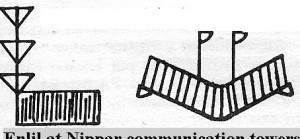
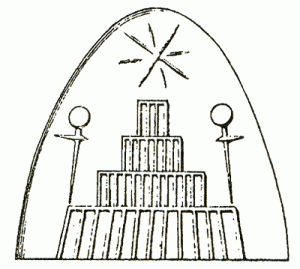 (Enlil‘s communication towers)
(Enlil‘s communication towers)
the ruler had a fattened sheep, a fat-tail sheep, and a grain-fed kid rest on hides of a virgin kid.
He put juniper, the mountains´ pure plant, onto the fire, and raised smoke with cedar resin, the scent of gods.
207-216 He rose to his master in public and prayed to him; he went to him in the Ubcukkina and saluted him:
´My master Nin-jirsu, lord who has turned back the fierce waters, true lord,
semen ejaculated by the Great Mountain (Enlil), noble young hero who has no opponent,
Nin-jirsu; I am going to build up your house for you, but I lack an ominous sign.
Warrior, you asked for perfection, but, son of Enlil, lord Nin-jirsu,
you did not let me know your will as to how to achieve it.
217-225 ´Your will, ever-rising as the sea, crashing down as a destructive flood, roaring like gushing waters,
destroying cities (?) like a flood-wave, battering against the rebel lands like a storm;
my master, your will, gushing water that no one can stem; warrior, your will inconceivable as the heaven –
can I learn anything about it from you, o son of Enlil, lord Nin-jirsu?´
226-231 Afterwards, Nin-jirsu stepped up to the head of the sleeper, briefly touching him:
´You who are going to build it for me, you who are going to build it for me, ruler, you who are going to build my house for me,
Gudea, let me tell you the ominous sign for building my house, let me tell you the pure stars of heaven indicating my regulations (?).
232-240 ´As if at the roaring of the Anzud bird (alien high-tech aircraft),
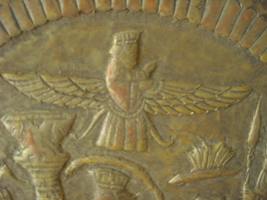 (Anu, king of the aliens, in his winged sky-disc)
(Anu, king of the aliens, in his winged sky-disc)
the heavens tremble at my house, the E-ninnu founded by An (Anu),
the powers of which are the greatest, surpassing all other powers, at the house whose owner looks out over a great distance.
Its fierce halo reaches up to heaven, the great fearsomeness of my house settles upon all the lands.
In response to its fame all lands will gather from as far as heaven´s borders, even Magan and Meluha will come down from their mountains.
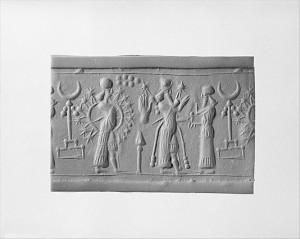
(Inanna Ninurta Enlil)
241-247´I am Nin-jirsu (Ninurta) who has turned back the fierce waters, the great warrior of Enlil´s realm, a lord without opponent.
My house the E-ninnu, a crown, is bigger than the mountains; my weapon the Car-ur (alien tech) subdues all the lands.

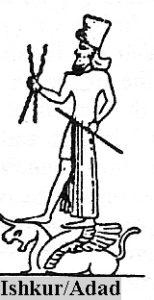 (Ninurta upon his winged sky-beast, his weaponized sky-disc)
(Ninurta upon his winged sky-beast, his weaponized sky-disc)
No country can bear my fierce stare, nobody escapes my outstretched arms.
248-253 ´Because of his great love, my father who begot me called me ´
´King, Enlil´s flood, whose fierce stare is never lifted from the mountains,
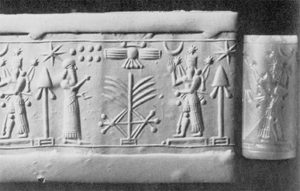 (Enlil & warrior son Ninurta with alien weaponry)
(Enlil & warrior son Ninurta with alien weaponry)
Nin-jirsu, warrior of Enlil´´, and endowed me with fifty powers. (alien high-tech weapon)
254-261 ´I lay the ritual table and perform correctly the hand-washing rites.
My outstretched hands wake holy An (Anu) from sleep.
My father who begot me receives the very best food from my hands.
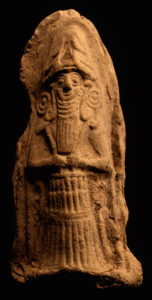 (Anu, King of planet Nibiru & Earth Colony, father in Heaven to the ruling gods on Earth)
(Anu, King of planet Nibiru & Earth Colony, father in Heaven to the ruling gods on Earth)
An, king of the gods, called me therefore ´´Nin-jirsu, king, lustration priest of An´´.
262-265 ´I founded the Tirac shrine with as much majesty as the Abzu.
Each month at the new moon the great rites (?), my ´´Festival of An´´, are performed for me perfectly in it.
266-270 ´Like a fierce snake, I built E-huc, my fierce place, in a dread location.
When my heart gets angry at a land that rebels against me – unutterable idea (?) –
it will produce venom (alien technologies) for me like a snake that dribbles poison.
271-276 In the E-babbar, where I issue orders, where I shine like Utu, there I justly decide the lawsuits of my city like Ictaran (Ninurta).
In the E-bagara, my dining place, the great gods of Lagac (Lagash) gather around me.
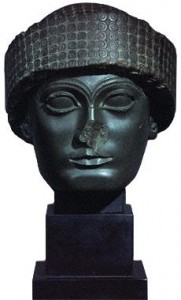
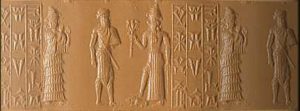
(giant King Gudes, walked & talked with giant alien gods from Heaven / planet Nibiru)
277-285 ´ When you, true shepherd (King) Gudea, really set to work for me on my house, the foremost house of all lands,
the right arm of Lagac, the Anzud bird roaring on the horizon (alien tech), the E-ninnu, my royal house,
I will call up to heaven for humid winds so that plenty comes down to you from heaven
and the land will thrive under your reign in abundance.
286-293 Laying the foundations of my temple will bring immediate abundance:
the great fields will grow rich for you, the levees and ditches will be full to brim for you,
the water will rise for you to heights never reached by the water before.
Under you more oil than ever will be poured and more wool than ever will weighed in Sumer.
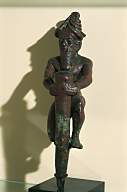
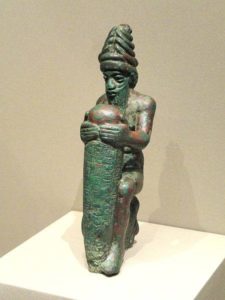
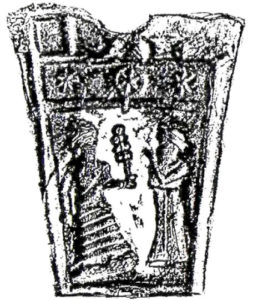
(Master Builder Ningishzidda with the temple foundation pegs; Ningishzidda & Gudea)
294-305 ´ When you drive in my foundation pegs for me, when you really set to work for me on my house,
I shall direct my steps to the mountains where the north wind dwells and make the man with enormous wings,
the north wind, bring you wind from the mountains, the pure place, so that this will give vigor to the land,
and thus one man will be able to do as much work as two.
At night the moonlight, at noon the sun will send plentiful light for you
so the day will build the house for you and the night will make it rise for you.
306-314 ´ I will bring halub and nehan trees up from the south,
and cedar, cypress and juniper together will be brought for you from the uplands.
From the ebony mountains I will have ebony trees brought for you,
in the mountains of stones I will have the great stones of the mountain ranges cut in slabs for you.
On that day I will touch your arm with fire and you will know my sign.´
315-322 Gudea rose – it was sleep; he shuddered – it was a dream.
Accepting Nin-jirsu´s words, he went to perform extispicy on a white kid.
He performed it on the kid and his omen was favorable.
Nin-jirsu´s intention became as clear as daylight to Gudea.
323-329 He is wise, and able too to realize things.
The ruler gave instructions to his city as to one man.
The land of Lagac became of one accord for him, like children of one mother.
He opened manacles, removed fetters; established ……, rejected legal complaints,
and locked up (?) those guilty of capital offenses (instead of executing them).
330-344 He undid the tongue of the goad and the whip, replacing them with wool from lamb-bearing sheep.
No mother shouted at her child. No child answered its mother back.
No slave who …… was hit on the head by his master, no misbehaving slave girl was slapped on the face by her mistress.
Nobody could make the ruler building the E-ninnu, Gudea, let fall a chance utterance.
The ruler cleansed the city, he let purifying fire loose over it.
He expelled the persons ritually unclean, unpleasant to look at, and …… from the city.
345-352 In respect of the …… of the brick-mold he had a kid lie down, and he requested from the kid an omen about the brick.
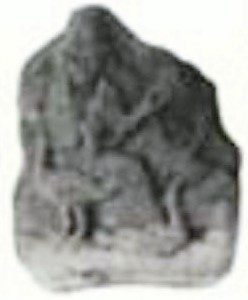 (Nanshe, daughter to Enki)
(Nanshe, daughter to Enki)
He looked at the excavated earth (?) approvingly, and the shepherd, called by his name by Nance, …… it with majesty.
After making a drawing on the …… of the brick mold and …… the excavated earth with majesty,
he made the Anzud bird, the standard of his master, glisten there as a banner.
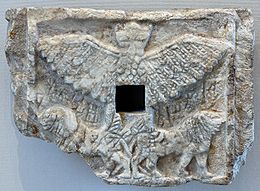 (storm-bird, symbol of Ninurta‘s victory over Anzu)
(storm-bird, symbol of Ninurta‘s victory over Anzu)
353-364 The citizens were purifying an area of 24 iku for him, they were cleansing that area for him.
He put juniper, the mountains´ pure plant, onto the fire and raised smoke with cedar resin, the scent of gods.
For him the day was for praying, and the night passed for him in supplications.
In order to build the house of Nin-jirsu, the Anuna (Anunnaki) gods of the land of Lagac
stood by Gudea in prayer and supplication, and all this made the true shepherd Gudea extremely happy.
365-371 Now the ruler imposed a levy on his land.
He imposed a levy on his realm of abundant ……, on Nin-jirsu´s Gu-edina.
He imposed levy on his built-up cities and settlements, on Nance´s Gu-jicbara.
372-376 There was a levy for him on the clans of Nin-jirsu ´
´Rampant fierce bull which has no opponent´´ and ´´White cedars surrounding their master´´,
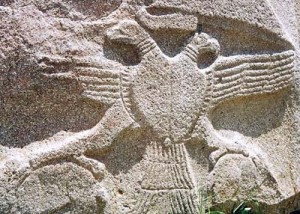
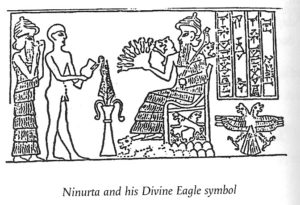 (double-headed eagle symbol of Ninurta, born of the “double seed” law of succession, by father Enlil & mother Enlil‘s 1/2 sister Ninhursag)
(double-headed eagle symbol of Ninurta, born of the “double seed” law of succession, by father Enlil & mother Enlil‘s 1/2 sister Ninhursag)
and he placed Lugalkurdub, their magnificent standard, in front of them.
377-381 There was a levy for him on the clan of Nance´
´Both river banks and shores rising out of the waters, the huger river, full of water,
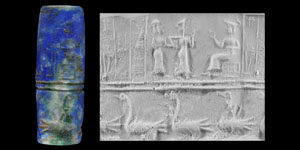 (Nanshe, Inanna, & Ningal)
(Nanshe, Inanna, & Ningal)
which spreads its abundance everywhere´´, and he placed the holy pelican (?), the standard of Nance, in front of them.
382-385 There was a levy for him on the clans of Inanna
´´The net suspended for catching the beasts of the steppe´´ and ´´Choice steeds, famous team, the team beloved by Utu´´,
and he placed the rosette, the standard of Inanna, in front of them.
386 In order to build the house of Nin-jirsu,
(5 lines missing or unclear)
392-396 The Elamites came to him from Elam, the Susians came to him from Susa.
Magan and Meluha loaded wood from their mountains upon their shoulders for him,
and to build the house of Nin-jirsu, they gathered for Gudea at his city Jirsu (Isin).
397-404 Nin-zaga (unidentified) was commanded and he made his copper,
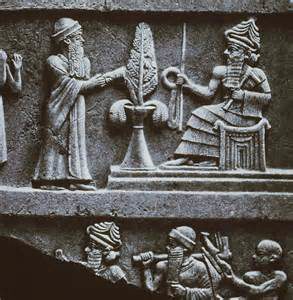 (bottom panel: Ninurta leads mixed-breed king to construction work-site)
(bottom panel: Ninurta leads mixed-breed king to construction work-site)
as much as if it were a huge grain transport, reach Gudea, the man in charge of building the house.
Nin-sikil (Ninsikila) was also instructed and she made large halub logs, ebony, and aba wood reach the ruler building the lagac.
405-411 Nin-jirsu has directed Gudea into the impenetrable mountain of cedars and he cut down its cedars with great axes
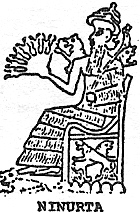 (Ninurta with his Car-ur, 50-headed mace, alien weaponry)
(Ninurta with his Car-ur, 50-headed mace, alien weaponry)
and carved the Car-ur (?), the right arm of Lagac, his master´s flood-storm weapon, out of it.
412-423 It was like a giant serpent floating on the water as, for lord Nin-jirsu,
Gudea had the long rafts floating downstream moor at the main quay of Kasura:
logs of cedar wood from the cedar hills, logs of cypress wood from the cypress hills,
logs of zabalum wood from the zabalum hills, tall spruce trees, plane trees, and eranum trees.
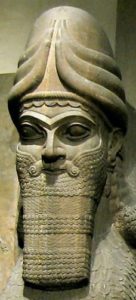 (Ninjirsu / Ninurta, heir to throne of planet Nibiru & Earth Colony, after grandfather King Anu, & father Enlil)
(Ninjirsu / Ninurta, heir to throne of planet Nibiru & Earth Colony, after grandfather King Anu, & father Enlil)
424-433 Nin-jirsu directed Gudea into the impenetrable mountains of stones, and he brought back great stones in the form of slabs.
For lord Nin-jirsu, Gudea had ships with hauna dock there, and ships with gravel, with dried bitumen, ……-bitumen,
and gypsum from the hills of Madga, cargoes like boats bringing grain from the fields.
434-445 Great things came to the succor of the ruler building the E-ninnu: a copper mountain in Kimac revealed itself to him.
He mined its copper into baskets (?).
To the man in charge of building his master´s house, the ruler, gold was brought in dust form from its mountains.
For Gudea refined silver was brought down from its mountains.
Translucent cornelian from Meluha was spread before him.
From the alabaster mountains alabaster was brought down to him.
446-451 The shepherd was going to build the house with silver, so he sat together with silversmiths.
He was going to build the E-ninnu with precious stone, so he sat with jewelers.
He was going to build it with copper and tin, so Nintu-kalama (unidentified) directed before him the chief of the smiths.
452-455 The heavy hammer-stones roared for him like a storm.
The dolerite, the light hammer-stone, …… two …… three.
…… like a huge mass of water gushing forth,
(2 lines missing or unclear)
458-462 He …… the days (?). Gudea prolonged the nights (?) for Nin-jirsu.
Because of building the house for his master, he neither slept at night, nor did he rest his head during the siesta.
463-470 For the one looked on with favor by Nance, for the favorite of Enlil, for the ruler …… by Nin-jirsu,
for Gudea, born in the august sanctuary by Jatumdug (Ninsun),
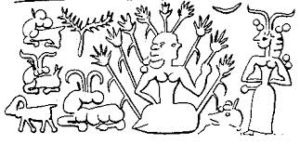 (Nisaba, Goddess of Grains, & young daughter Ninlil, Enlil‘s spouse)
(Nisaba, Goddess of Grains, & young daughter Ninlil, Enlil‘s spouse)
Nisaba (Enlil‘s mother-in-law) opened the house of understanding and Enki put right the design of the house.
471-481 Towards the house whose halo reaches to heaven, whose powers embrace heaven and earth,
whose owner is a lord with a fierce stare, whose warrior Nin-jirsu is expert at battle,
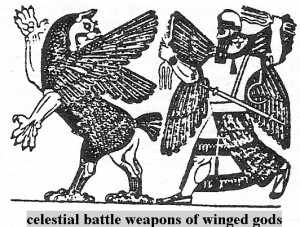
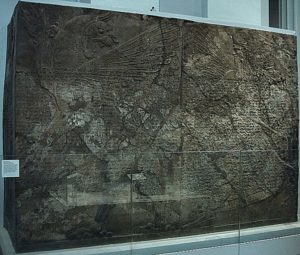 (Anzu vrs. Ninurta)
(Anzu vrs. Ninurta)
towards E-ninnu-the-white-Anzud–bird, Gudea went from the south and admired it northwards.
From the north he went towards it and admired it southwards.
He measured out with rope exactly one iku.
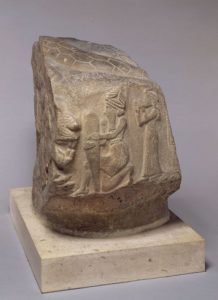 (Ningishzidda & Gudea‘s mother Ninsun, Foundation Peg of Gudea 2,100 B.C.)
(Ningishzidda & Gudea‘s mother Ninsun, Foundation Peg of Gudea 2,100 B.C.)
He drove in pegs at its sides and personally verified them.
This made him extremely happy.
482-491 When the night fell, he went to the old temple to pray,
so that the inclination of the one from the dais of Jirnuni, Nin-jirsu would become favorable for Gudea.
When day broke, he took a bath and arranged his outfit correctly. Utu let abundance come forth for him.
Gudea left Iri-kug a second time; he sacrificed a perfect bull and a perfect kid.
He went to the house and saluted it.
492-498 He …… the holy basket and true fated brick mold …… the E-ninnu.
As he (Gudea) …… and walked proudly, Lugal-kur-dub walked in front of him,
Ig-alim (Ninurta‘s son, chief superintendent, bailiff) directed him
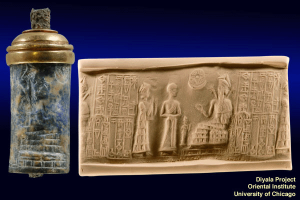 (Ninsun, her son-king Gudea, & Ningishzidda)
(Ninsun, her son-king Gudea, & Ningishzidda)
and Nin-jiczida (Ningishzidda), his personal god, held him by the hand throughout the time.
499-512 He poured clear water into the …… of the brick mould – adab, sim and ala drums were playing for the ruler.
He prepared the excavated earth for making (?) the brick, and hoed honey, ghee and precious oil into it.
He worked ambergris and essences from all kinds of trees into the paste.
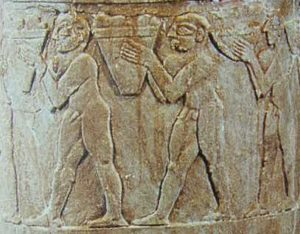 (earthling workers, directed by the king, who was directed by the gods)
(earthling workers, directed by the king, who was directed by the gods)
He lifted up the holy carrying-basket and put it next to the brick mold.
Gudea placed the clay into the brick mold and acted exactly as prescribed,
bringing the first brick of the house into existence in it, while all the bystanders sprinkled oil or cedar perfume.
His city and the land of Lagac spent the day with him in joy.
513-522 He shook the brick mold and left the brick to dry.
He looked at the …… with satisfaction.
He anointed it with cypress essence and ambergris.
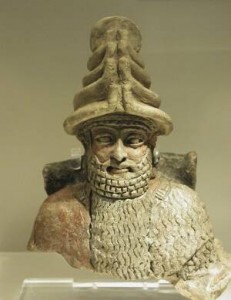 (Utu, Nannar‘s son, Inanna‘s twin, Commander of the Space Port)
(Utu, Nannar‘s son, Inanna‘s twin, Commander of the Space Port)
Utu rejoiced over the brick put into the mold by Gudea, and king Enki …… the …… rising like great river.
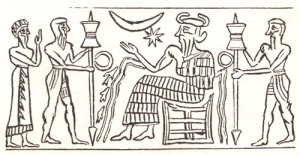
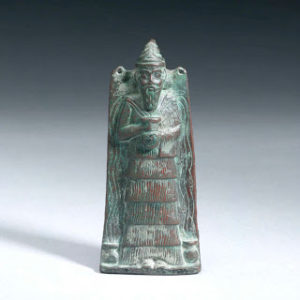 (Enki in his patron city Eridu)
(Enki in his patron city Eridu)
…… and Gudea went into the house.
523-542 He raised the brick out of the …… of the mold, and it looked as a holy crown worn by An.
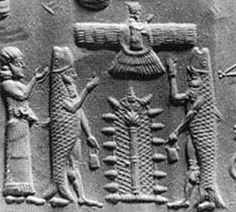 (An / Anu, father in Heaven / planet Nibiru, in his winged sky-disc)
(An / Anu, father in Heaven / planet Nibiru, in his winged sky-disc)
He lifted up the brick and went around among his people: it was like Utu´s holy team tossing (?) their heads.
The brick lifting its head toward the house was as if Nanna´s (Nannar‘s) cows were eager to be tethered in their pen.
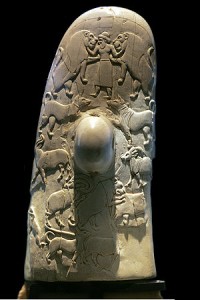 (Nannar‘s cow pens holding a million cows located in Ur, feeding gods & earthlings)
(Nannar‘s cow pens holding a million cows located in Ur, feeding gods & earthlings)
He put down the brick, entered the house and as if he himself were Nisaba (Enlil‘s mother-in-law)
knowing the inmost secrets (?) of numbers, he started setting down (?) the ground plan of the house.
As if he were a young man building a house for the first time, sweet sleep never came into his eyes.
Like a cow keeping an eye on its calf, he went in constant worry to the house.
Like a man who takes but little food into his mouth, he went around untiringly.
The intention of his master had become clear for him, the words of Nin-jirsu had become as conspicuous as a banner.
In (?) his heart beating loudly because of building the house, someone …… a propitious ominous remark.
This made him extremely happy.
543-550 He performed extispicy on a kid and his omen was favorable.
He cast grain on to …… and its appearance was right.
Gudea lay down for a dream oracle, and while he was sleeping a message came to him:
in the vision he saw his master´s house already built, the E-ninnu separating heaven and earth.
This made him extremely happy.
551-561 He stretched out lines in the most perfect way; he set up (?) a sanctuary in the holy uzga.
In the house, Enki drove in the the foundation pegs,
while Nance, the daughter of (Enki) Eridu, took care of the oracular messages.
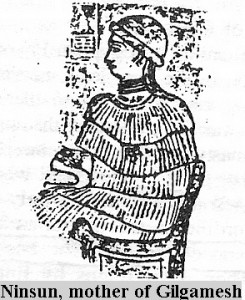 (mother to gods & many mixed-breed son-kings)
(mother to gods & many mixed-breed son-kings)
The mother of Lagac, holy Jatumdug (Ninsun, Bau‘s daughter), gave birth to its bricks amid cries (?),
and Bau (Ninurta‘s spouse), the lady, first-born daughter of An (Anu), sprinkled them with oil and cedar essence.
En and lagar priests were detailed to the house to provide maintenance for it.
The Anuna (Anunnaki) gods stood there full of admiration.
 (Gudea with the “carrying basket for the house”)
(Gudea with the “carrying basket for the house”)
562-577 Gudea, in charge of building the house, placed on his head the carrying-basket for the house, as if it were a holy crown.
He laid the foundation, set the walls on the ground.
He marked out a square, aligned the bricks with a string.
He marked out a second square on the site of the temple, saying,
´It is the line-mark for a topped-off jar of 1 ban capacity (?)´.
He marked out a third square on the site of the temple, saying,
´It is the Anzud bird enveloping its fledgling with its wings´.
He marked out a fourth square on the site of the temple, saying, ´It is a panther embracing a fierce lion´.
He marked out a fifth square on the site of the temple, saying, ´It is the blue sky in all its splendor´.
He marked out a sixth square on the site of the temple, saying, ´It is the day of supply, full of luxuriance´.
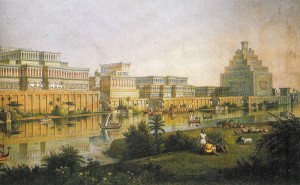 (Ninurta‘s patron city & ziggurat in Lagash, a re-creation)
(Ninurta‘s patron city & ziggurat in Lagash, a re-creation)
He marked out a seventh square (7-step pyramid house) on the site of the temple, saying,
´It is the E-ninnu bathing the country with moonlight at dawn´.
578-590 They inserted the wooden door frames, which were like a crown worn in the blue sky.
As Gudea sat down at a wooden door frame, from there it was like a huge house embracing heaven.
As he built the house and laid wooden scaffolding against it, it was like Nanna´s (Nannar) lagoon attended by Enki.
They made the house grow as high as the hills, they made it float in the midst of heaven as a cloud,
they made it lift its horns as a bull and they made it raise its head above all the lands, like the jicgana tree over the Abzu.
As the house had been made to lift its head so high as to fill the space between heaven and earth like the hills,
it was like a luxuriant cedar growing among high grass (?);
E-ninnu was decorated most alluringly among Sumer´s buildings.
591-601 As they placed wooden beams on the house, they looked like dragons of the Abzu coming out all together,
they were like …… of heaven ……, they were like huge serpents of the foothills …….
The reeds cut for the house were like mountain snakes sleeping together.
Its upper parts were covered with luxuriant cedar and cypress,
and they put white cedars in its inner room of cedar, marvelous to behold.
They treated them with with good perfume and oil.
The mud-wall of the house was covered with the abundance (?) of the Abzu and they tied its …… to it.
The shrine of E-ninnu was thus placed in the …… hand of An.
602-616 The ruler built the house, he made it high, high as a great mountain.
Its Abzu foundation pegs, big mooring stakes, he drove into the ground so deep they could take counsel with Enki in the E-engur.
He had heavenly foundations pegs surround the house like warriors,
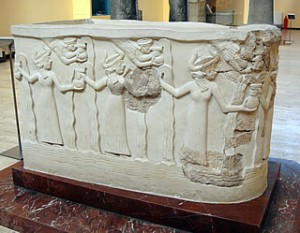 (alien goddesses with life-giving waters)
(alien goddesses with life-giving waters)
so that each one was drinking water at the libation place of the gods.
He fixed the E-ninnu, the big mooring stake, he drove in its pegs shaped like praying wizards.
He planted the pleasant poplars of his city so that they cast their shadow.
He embedded its Car-ur weapon (alien tech) beside Lagac like a big standard,
placed it in its dreadful place, the Cu-galam (?), and made it emanate fearsome radiance.
On the dais of Jirnun, on the place of making judgments, the provider of Lagac lifted his horns like a mighty bull.
617-624 It took one year to bring the great stones in slabs and it took another year to fashion them,
although not even two or three days did he let pass idly.
Then it needed a day’s work to set up each one but by the seventh day, he had set them all up around the house.
He laid down the trimmings from the slabs as stairs, or fashioned basins from them, and had them stand in the house.
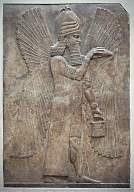 (winged pilot Ninurta, Enlil‘s son & heir, patron god of Lagash, Bau‘s spouse)
(winged pilot Ninurta, Enlil‘s son & heir, patron god of Lagash, Bau‘s spouse)
625-629 The stela which he set up in the great courtyard he named as
´´The king who …… the courtyard, lord Nin-jirsu, has recognized Gudea from the Jirnun´´.
630-635 The stela which he set up at the Kasura gate he named as
´´The king, Enlil´s flood storm, who has no opponent, lord Nin-jirsu, has looked with favor at Gudea´´.
636-641 The stela which he set up facing the rising sun he named as
´´The king, the roaring storm of Enlil, the lord without rival, lord Nin-jirsu, has chosen Gudea with his holy heart´´.
642-646 The stela which he set up facing Cu-galam he named as
´´The king, at whose name the foreign countries tremble, lord Nin-jirsu, has made Gudea´s throne firm´´.
647-650 The stela which he set up facing E-uru-ga he named as ´´The lord Nin-jirsu has decided a good fate for Gudea´´.
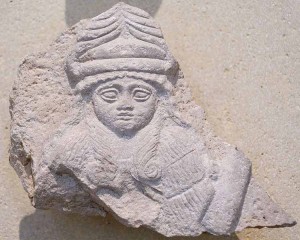
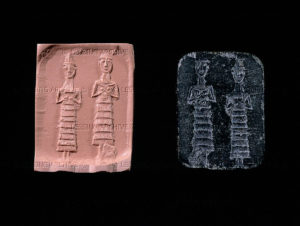 (Bau, King Anu‘s daughter; Bau & spouse Ninurta)
(Bau, King Anu‘s daughter; Bau & spouse Ninurta)
651-654 The stela which he set up by the inner room (?) of Bau he named as ´´The eyes of An know the E-ninnu, and Bau is the life source of Gudea´´.
655-664 He built his master´s house exactly as he had been told to.
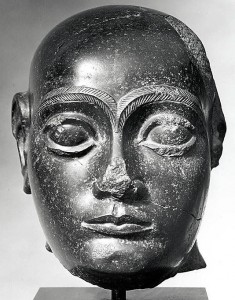 (Gudea, mixed-breed son to Ninsun, appointed to kingship, perfect go-between for the gods with earthlings)
(Gudea, mixed-breed son to Ninsun, appointed to kingship, perfect go-between for the gods with earthlings)
The true shepherd Gudea made it grow so high as to fill the space between heaven and earth,
had it wear a tiara shaped like the new moon, and had its fame spread as far as the heart of the highlands.
Gudea made Nin-jirsu´s house come out like the sun from the clouds,
had it grow to be like hills of lapis lazuli and had it stand to be marveled at like hills of white alabaster.
665-672 He made its door-sockets stand like wild bulls and he flanked them with dragons crouching on their paws like lions.
He had its terraced tower (?) grow on a place as pure as the Abzu.
He made the metal tops of its standards twinkle as the horns of the holy stags of the Abzu.
Gudea made the house of Nin-jirsu stand to be marveled at like the new moon in the skies.
673-687 The built-in door-sockets of the house are lahama deities standing by the Abzu.
Its timber store (?) looks like waves (?) of an enormous lagoon where snakes have dived (?) into the water.
Its …… is …… full of fearsomeness.
Its …… is a light floating in the midst of heaven.
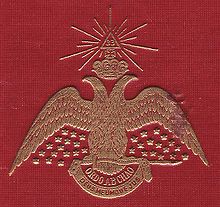 (Ninurta‘s double-headed eagle symbol then & now)
(Ninurta‘s double-headed eagle symbol then & now) 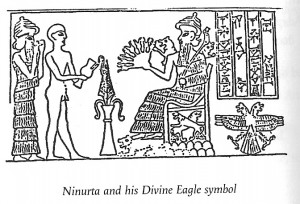
On the ´´Gate where the king enters´´ an eagle is raising its eyes toward a wild bull.
Its curved wooden posts joining above the gate are a rainbow stretching over the sky.
Its upper lintel of the gate like (?) the E-ninnu stands among rumbling, roaring storms.
Its awe-inspiring eyebrow-shaped arch (?) meets the admiring eyes of the gods.
His white shrine …… of the house is a firmly founded lapis lazuli mountain connecting heaven and earth.
688-695 They installed the great dining hall for the evening meals:
it was as if An himself were setting out golden bowls filled with honey and wine.
They built the bedchamber: it is the Abzu´s fruit-bearing holy mes tree among innumerable mountains.
He finished with the building, which made the hearts of the gods overflow with joy.
696-721 The true shepherd Gudea is wise, and able too to realize things.
In the inner room (?) where the weapons hang, at the ´´Gate of Battle´´
he had the warriors Six-headed wild ram and ……-head take their stand.
Facing the city, its place laden with awe, he had the Seven-headed serpent take its stand.
In Cu-galam, its awesome gate, he had the Dragon and the Date palm take their stand.
Facing the sunrise, where the fates are decided,
he erected the standard of Utu, the Bison head, beside others already there.
At the Kasura gate, at its lookout post, he had the Lion,the terror of the gods, take its stand.
In the Tar-sirsir, where the orders are issued, he had the Fish-man and the Copper take their stand.
In Bau´s inner room (?), where the heart can be soothed, he had the Magilum boat and the Bison take their stand.
Because these were warriors slain by Nin-jirsu, he set their mouths towards libation places.
Gudea, the ruler of Lagash, made their names appear among those of the gods.
722-729 The cedar doors installed in the house are Ickur (Ishkur / Adad) roaring above.
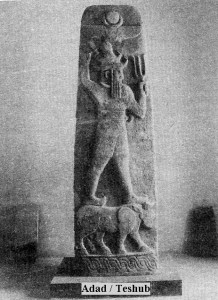 (Adad, Enlil‘s son, younger than brothers Ninurta & Nannar)
(Adad, Enlil‘s son, younger than brothers Ninurta & Nannar)
The locks of the E-ninnu are bisons, its door-pivots are lions,
from its bolts horned vipers and fierce snakes are hissing at wild bulls.
Its jambs, against which the door leaves close, are young lions and panthers lying on their paws.
730-737 The shining roof-beam nails hammered into the house are dragons gripping a victim.
The shining ropes attached to the doors are holy Nirah (unidentified?) parting the Abzu.
Its …… is pure like Kec (Kish) and Aratta, its …… is a fierce lion keeping an eye on the country;
nobody going alone can pass in front of it.
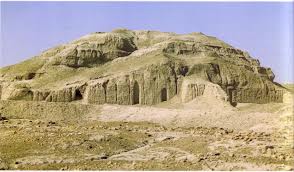 (Uruk ziggurat / residence of alien gods & goddesses)
(Uruk ziggurat / residence of alien gods & goddesses)
738-758 The fearsomeness of the E-ninnu covers all the lands like a garment.
The house! It is founded by An on refined silver, it is painted with kohl,
and comes out as the moonlight with heavenly splendor.
The house! Its front is a great mountain firmly grounded,
its inside resounds with incantations and harmonious hymns, its exterior is the sky, a great house rising in abundance,
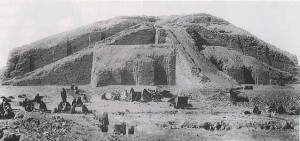 (Uruk‘s residence for giant aliens)
(Uruk‘s residence for giant aliens)
its outer assembly hall is the Anuna gods´ place of rendering judgments,
from its …… words of prayer can be heard, its food supply is the abundance of the gods,
its standards erected around the house are the Anzud bird spreading its wings over the bright mountain.
E-ninnu´s clay plaster, harmoniously blended clay taken from the Edin (Eden) canal,
has been chosen by Lord Nin-jirsu with his holy heart,
and was painted by Gudea with the splendors of heaven as if kohl were being poured all over it.
759-769 From its cow-pen cream and milk are brought in.
From its huge oven, great cakes and croissants come.
Its …… feeds cattle and sheep.
Its house of food rations …… an uzga shrine.
Its regular offerings are a mountain oozing wine, from its brewery as much beer comes as the Tigris at high water.
770-780 Its storehouse is full of gems, silver and tin.
Its coach-house is a mountain set on the ground.
Its drum hall is a roaring bull.
Its courtyard resounds with holy prayers, sim and ala drums.
Its stone stairs, laid before the house, are like a mountain range lying down in princely joy.
Its upper stairs leading (?) to the roof are like a light clearly visible as far as the mountains.
Its vineyard ´´Black garden in the steppe´´, planted near the house,
is a mountain oozing wine and grows in a place with fearsome radiance.
781-798 The seven stones surrounding the house are there to take counsel with its owner.
Its chapel for funerary offerings is as pure as the clean Abzu.
The stone basins set up in the house are like the holy room of the lustration priest where water never ceases to flow.
Its high battlements where pigeons live is ……
Eridu ……. E-ninnu offers rest to pigeons, it is a protective cover with large branches and a pleasant shade,
with swallows and other birds chirping loudly there.
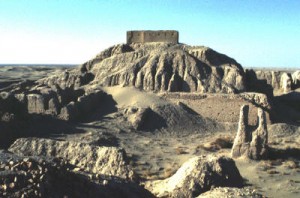 (E-kur, Enlil‘s ziggurat / residence in Nippur)
(E-kur, Enlil‘s ziggurat / residence in Nippur)
It is Enlil´s E-kur (Enlil‘s temple / residence) when a festival takes place in it.
The house´s great awesomeness settles upon the whole Land, its praise reaches to the highlands,
the awesomeness of the E-ninnu covers all lands like a garment.
799-803 The house has been built most sumptuously by its lord.
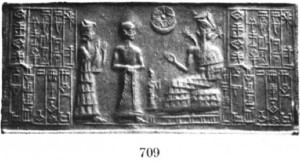 (Ninsun, her son-king Gudea, & Ningishzidda)
(Ninsun, her son-king Gudea, & Ningishzidda)
It was built on a pedestal by Ningiczida (Ningishzidda, Enki‘s son).
Its foundation pegs were driven in by Gudea, the ruler of Lagac (Lagash).
804-812 For the restoration of E-ninnu, the house that rises like the sun over the country,
stands like a great bull in the …… sand, illuminates the assembly like delightful moonlight,
is as sumptuous as lush green foothills, and stands to be marveled at, praise be to Nin-jirsu!
813-814 This is the middle of the hymn
´´The building of Nin-jirsu´s house´´.
Cylinder B | (Cylinder A)
815-819House, mooring post of the land, grown so high as to fill the space between heaven and earth,
E-ninnu, the true brickwork, for which Enlil determined a good fate,
green hill standing to be marveled at, standing out above all the lands.
820-823 The house is a great mountain reaching up to the skies.
It is Utu filling the midst of the heaven;
E-ninnu is the white Anzud bird spreading its talons upon the mountain land.
824-829 All the people were placed (?) before it, the whole country was detailed (?) to it.
The Anuna gods stood there in admiration.
The ruler, who is wise, who is knowledgeable, kissed the ground before that godly company.
He touched the ground in prostration (?), with supplications and prayers;
the ruler, the god of his city prayed.
830-833 For the bread-consuming house he added more and more bread,
for the suppers in need of mutton he added sheep.
In front of the house he lined up bowls like …… abundance …….
834-841 He went to the Anuna gods and prayed to them:
´O all you Anuna gods, admired by the land of Lagac, protectors of all the countries,
whose command, a massive breach in a dam, carries away any who try to stop it.
The worthy young man on whom you have looked will enjoy a long life.
I, the shepherd, built the house, and now I will let my master enter his house.
O Anuna gods, may you pray on my behalf!´
842-850 The true shepherd Gudea is wise, and able too to realize things.
His friendly guardian went before him and his friendly protecting genius followed him.
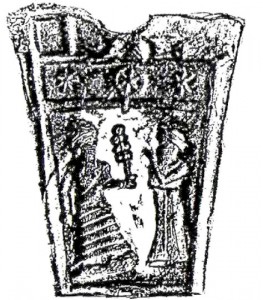 (Ningishzidda & giant mixed-breed King Gudea)
(Ningishzidda & giant mixed-breed King Gudea)
For his master, lord Nin-jirsu Gudea gave numerous gifts to the house of yore,
the old house, his dwelling place.
He went into the E-ninnu to the lord, and prayed to him:
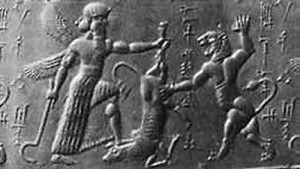 (Ninurta eliminates unwanted demons on Earth)
(Ninurta eliminates unwanted demons on Earth)
851-862 ´My master Nin-jirsu, lord who has turned back the fierce waters,
lord whose commands take precedence, male child of Enlil, warrior,
I have carried out faithfully what you have ordered me to do.
Nin-jirsu, I have built up your house for you; now I shall let you enter it in joy!
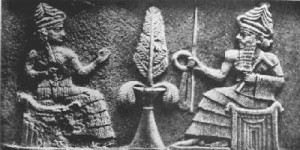 (Bau & her nephew-spouse Ninurta)
(Bau & her nephew-spouse Ninurta)
My goddess Bau, I have set up your E-mi quarters for you: take up pleasant residence in them.´
His call was heard, his master Lord Nin-jirsu accepted from Gudea his prayer and supplication.
863-871 The year ended and the month was completed.
A new year started, a month began and three days elapsed in that month.
As Nin-jirsu arrived from Eridu, beautiful moonlight shone illuminating the land,
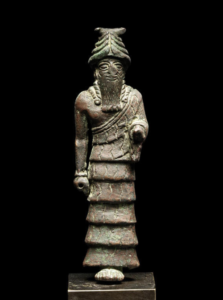
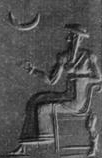 (Nannar, Enlil‘s & Ninlil‘s son, the Moon god)
(Nannar, Enlil‘s & Ninlil‘s son, the Moon god)
and the E-ninnu competed with the new-born Suen (Sin / Nannar).
872-882 Gudea made a paste with cornelian and lapis lazuli and applied it to the corners.
He sprinkled the floor with precious oil.
He made the ……, who worked there (?), leave the house.
Syrup, ghee, wine, sour milk, jipar fruit, fig-cakes topped with cheese,
dates, …… and small grapes, things untouched by fire,
these were the foods for the gods which he prepared with syrup and ghee.
883-891 On the day when the true god was to arrive,
Gudea was busy with the evening meal from early morning.
Asari (Ashur) cared for the maintenance of the house.
Nin-mada (Enlil‘s son) took care of its cleaning.
King Enki gave oracular pronouncements concerning it.
Nin-dub, the chief purification priest of Eridu, filled it with the smoke of incense.
The lady of precious rites, Nance, versed in singing holy songs, sang songs for the house.
892-906 They sheared the black ewes and milked the udder of the cow of heaven.
They cleaned the E-ninnu, they polished it with brooms of tamarisk and …….
The ruler made the whole city kneel down, made the whole land prostrate itself.
He leveled what was high, rejected chance utterances (?); the sorcerers´ spittle (?) was removed from the roads.
In the city only the mother of a sick person administered a potion.
The wild animals, creatures of the steppe, all had crouched together.
The lions and the dragons of the steppe were lying in sweet sleep.
907-909 The day was for supplication, the night was for prayer.
The moonlight …… early morning.
Its master ……
910-924 Warrior Nin-jirsu entered the house, the owner of the house had arrived.
He was an eagle raising its eyes toward a wild bull.
The warrior´s entering his house was a storm roaring into battle.
Nin-jirsu entered his house and it became the shrine of Abzu when there is a festival.
The owner came out of his house and he was Utu rising over the land of Lagac.
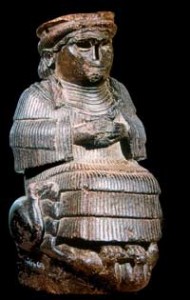 (Bau, King Anu‘s daughter, Ninurta‘s spouse & aunt)
(Bau, King Anu‘s daughter, Ninurta‘s spouse & aunt)
Bau´s going to her E-mi quarters was a true woman´s taking her house in hand.
Her entering her bedroom was the Tigris at high water.
When she sat down beside her ……, she was the lady, the daughter of holy An, a green garden bearing fruit.
925-928 The daylight came out, the fate had been decided.
Bau entered her E-mi quarters, and there was abundance for the land of Lagac.
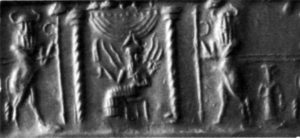 (Utu, Nannar‘s son, the Sun god)
(Utu, Nannar‘s son, the Sun god)
The day dawned. Utu (Sun god) of Lagac lifted his head over the land.
929-933 The house received fattened oxen and sheep.
Bowls were set up in the open air and were filled with wine.
The Anuna gods of the land of Lagac gathered around Nin-jirsu.
In the house the purification had been completed, the oracular pronouncements had been taken care of.
934-943 Wine was poured from big jars while …… was heaped up in the E-ninnu.
Nin-dub caused the sanctuary to be full of clatter and noise (?)
and with fresh bread and hind´s milk available day and night,
he woke from sleep the noble one, the beloved son of Enlil, the warrior Nin-jirsu.
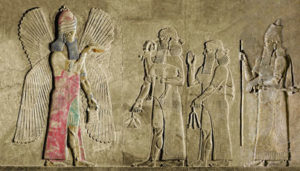 (giant winged pilot Nin-jirsu / Ninurta, Enlil‘s son & heir)
(giant winged pilot Nin-jirsu / Ninurta, Enlil‘s son & heir)
Nin-jirsu raised his head with all the great powers, and …… rituals, …… for (?) the sanctuary E-ninnu.
944-956 With his divine duties, namely to guide the hand of the righteous one;
to force the evil-doer´s neck into a neck stock; to keep the house safe;
to keep the house pleasant; to instruct his city and the sanctuaries of Jirsu;
to set up an auspicious throne; to hold the scepter of never-ending days;
to raise high the head of Nin-jirsu´s shepherd, Gudea, as if he wore a blue crown;
and to appoint to their offices in the courtyard of E-ninnu
the skin-clad ones, the linen-clad ones and those whose head is covered,
Gudea introduced Ig-alim (Ninurta‘s son), the Great Door (ig gal),
the Pole (dim) of Jirnun, the chief bailiff of Jirsu, his beloved son to lord Nin-jirsu.
957-970 With his divine duties, namely to keep the house clean;
to let hands always be washed; to serve water to the lord with holy hands;
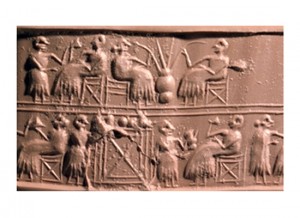 (drinking beer through straws at Sumerian banquett)
(drinking beer through straws at Sumerian banquett)
to pour beer into bowls; to pour wine into jars; to make emmer beer in the brewery fizz
like the water of the Papsir canal, the house of pure strength;
to make certain that faultless cattle and goats, grain-fed sheep,
fresh bread and hind´s milk are available day and night;
to wake from sleep the noble one, Enlil´s beloved son,
warrior Nin-jirsu by offering (?) food and drink, Gudea introduced Cul-caga (unidentified?),
the lord of the pure hand-washings (cu-luh), the first-born son of E-ninnu to Nin-jirsu.
971-982 With his divine duties, namely to carry the seven-headed mace;
to open the door of the an-kara house, the gate of battle;
to hit exactly with the dagger blades, with the mitum mace,
with the ´´floodstorm´´ weapon and with the marratum club,
its battle tools; to inundate Enlil´s enemy land,
Gudea introduced Lugalkurdub, the warrior Carur (unidentified?),
who in battle subdues all the foreign lands, the mighty general of the E-ninnu,
a falcon against the rebel lands, his general, to lord Nin-jirsu.
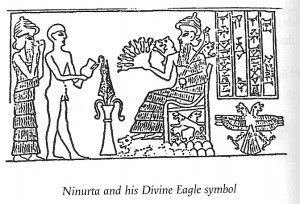 (Ningishzidda, high-priest Gudea, & Ninurta)
(Ningishzidda, high-priest Gudea, & Ninurta)
983-989 After the heavenly mitum mace had roared against the foreign lands like a fierce storm –
the Carur, the flood storm in battle, the cudgel for the rebel lands –
after the lord had frowned at the rebellious land,
the foreign country, hurled at it his furious words, driven it insane
the text here seems to be corrupt, and there may be some lines missing,
990-992 With his divine duties, Gudea introduced the lord´s second general,
Kur-cuna-buruam (unidentified?) to the son of Enlil.
993-1005 With his divine duties, namely to send entreaties on behalf of the land of Lagac;
to perform supplications and prayers for it, propitious ones;
to greet pleasantly the warrior departing for Eridu; and until (?) Nin-jirsu comes from Eridu,
to keep the throne of the built-up city firm; to pray, with hand placed before the nose,
together with Gudea, for the life of the true shepherd,
Gudea introduced his adviser, Lugal-sisa (unidentified?), to lord Nin-jirsu.
1006-1014 With his divine duties, namely to request; to command;
to co-operate with the one speaking straightforwardly; to …… the one speaking evil;
to inform Nin-jirsu, the warrior sitting on a holy dais in the E-ninnu,
Gudea introduced Cakkan, the wild ram, the minister of the E-duga, his ……, to lord Nin-jirsu.
1015-1023 With his divine duties, namely to clean with water; to clean with soap;
to …… with oil from white bowls and with (?) soap;
to urge him to sweet sleep on his bed strewn with fresh herbs;
to let him enter the E-duga, his bed chamber, from outside (?)
and to make him not wish to leave it,
Gudea introduced Kinda-zid (unidentified?), the man in charge of the E-duga,
to lord Nin-jirsu.
1024-1034 With his divine duties,
namely to yoke up the holy chariot decorated with stars;
to harness the donkey stallion, Pirij-kase-pada, before it; to …… a slender donkey from Eridu ……;
to have stallions joyfully transport their owner Nin-jirsu,
Gudea introduced En-signun (unidentified?), who roars like a lion,
who rises like a flood storm, Nin-jirsu´s hurrying bailiff, his donkey herd, to lord Nin-jirsu.
1035-1040 With his divine duties, namely, to make the fat abundant; to make the cream abundant;
to see that the fat and the milk of the holy goats, the milking goats, and the hind,
the mother of Nin-jirsu, do not cease to flow in the E-ninnu sanctuary,
Gudea introduced En-lulim (unidentified?), the herdsman of the hinds, to lord Nin-jirsu.
1041-1047 With his divine duties, namely to tune properly
the sweet-toned tigi instrument; to fill the courtyard of E-ninnu with joy;
to make the algar and miritum, instruments of the E-duga,
offer their best in the E-ninnu to the warrior with an ear for music,
Gudea introduced his beloved musician, Ucumgal-kalama (unidentified?), to lord Nin-jirsu.
1048-1057 With his divine duties, namely to soothe the heart,
to soothe the spirits; to dry weeping eyes; to banish mourning from the mourning heart;
to …… the heart of the lord that rises like the sea,
washes away like the Euphrates, that hits like a flood storm,
that has overflowed with joy after inundating a land which is Enlil´s enemy,
Gudea introduced his balaj drum, Lugal-igihuc (unidentified?), to lord Nin-jirsu.
1058-1069 Zazaru, Ickur-pa-ed, Ur-agrunta-ea, He-girnuna, He-caga, Zurju and Zarju,
who are Bau´s septuplets, the offspring of lord Nin-jirsu,
his beloved lukur maidens, who create plenty for the myriads,
stepped forward to lord Nin-jirsu with friendly entreaties on behalf of Gudea.
1070-1081 With his divine duties, namely to see that the great fields grow rich;
to see that the levees and ditches of Lagac will be full to the brim;
to see that Acnan, the bright and long one, the pure stalk,
will raise its head high in the furrows in Gu-edina, the plain befitting its owner;
to see that after the good fields have provided wheat, emmer and all kinds of pulses,
the numerous grain heaps – the yield of the land of Lagac – will be heaped up,
Gudea introduced Jicbar-ed (unidentified?), Enlil´s surveyor, the farmer of Gu-edina, to lord Nin-jirsu.
1082-1087 With his divine duties, namely to make sure that Imin-catam (unidentified?),
the messenger of Gu-edina, informs Nin-jirsu about the amount of carp and perch yielded by the marshes,
and about the quantity of new shoots of reed yielded by the green reedbeds,
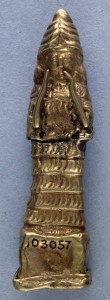
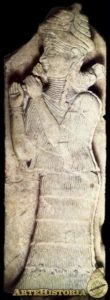 (Lama / Ninsun, adorning goddess-mother to many mixed-breed kings)
(Lama / Ninsun, adorning goddess-mother to many mixed-breed kings)
Gudea introduced Lama, the inspector of the fisheries of Gu-edina, to lord Nin-jirsu.
1088-1099 With his divine duties, namely to administer the open country,
the pleasant place; to give directions concerning the Gu-edina,
the pleasant open country; to make its birds propagate (?);
to have them lay their eggs in nests (?); to have them rear their young;
to see that the multiplication of the beasts of Nin-jirsu´s beloved countryside does not diminish,
Gudea introduced Dimgal-abzu (unidentified?), the herald of Gu-edina, to lord Nin-jirsu.
1100-1106 With his divine duties, namely to erect cities; to found settlements;
to build guard-houses for the wall of the Iri-kug; to have its divine resident constable,
the mace of white cedar with its enormous head, patrol around the house,
Gudea introduced Lugal-ennu-irikugakam (unidentified?) to lord Nin-jirsu.
1107-1117 Holy An made the location appropriate.
Enlil wound (?) a turban (?) round its top.
Nin-hursaj (Ninhursag) looked at it approvingly.
Enki, the king of Eridu, drove in its foundation pegs.
The true lord with a pure heart, Suen (Nannar), made its powers the largest in heaven and on earth.
Nin-jirsu chose it among shrines of sprouting seeds with his heart.
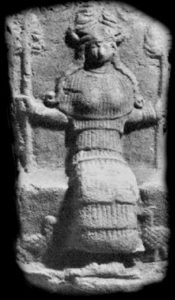 (mother Nanshe, Goddess of Persian Gulf Birds & Fishes)
(mother Nanshe, Goddess of Persian Gulf Birds & Fishes)
Mother Nance cared for it especially among the buildings of the land of Lagac.
But it was the god of most reliable progeny who built the house and made its name famous.
1118-1124 The mighty steward of Nance (Enki‘s daughter), the accomplished shepherd of Nin-jirsu,
is wise, and able too to realize things; the man in charge of building the house,
Gudea the ruler of Lagac, was to make presents for the house.
1125-1142 Gudea, the ruler in charge of building the house, presented it with the chariot
´´It makes the mountains bow down´´,
which carries awesome radiance and on which fearsomeness rides
and with its donkey stallion, Ud-gu-dugduga, to serve before it;
with the seven-headed mace, the fierce battle weapon (alien technology),
the weapon unbearable both for the North and for the South, with a battle cudgel, with the mitum mace,
with the lion-headed weapon made from nir stone, which never turns back before the highlands,
with dagger blades, with nine standards, with the ´´strength of heroism´´,
with his bow which twangs like a mes forest, with his angry arrows which whiz like lightning flashes
in battle and with his quiver, which is a like a lion, a pirij lion, or a fierce snake sticking out its tongue –
strengths of battle endued with the power of kingship.
1143-1154 Along with copper, tin, slabs of lapis lazuli, refined silver and pure Meluha cornelian,
he set up (?) huge copper cauldrons, huge …… of copper,
shining copper goblets and shining copper jars worthy of An,
for laying (?) a holy table in the open air …… at the place of regular offerings (?).
Nin-jirsu gave his city, Lagac (Lagash) …….
He set up his bed within the bedchamber, the house´s resting place;
and everyone (?) rested like birds in the streets with the son of Enlil.
1155-1181 With his duties, namely to fill the channels with flowing water;
to make the marshes full with carp and perch (?)
and to have the inspector of fisheries and the inspector of dykes stand at their posts;
to fill the great waters with boats carrying grain; to see that tons, heaps and tons –
the yield of the land of Lagac – will be piled up; to see that cattle-pens and sheepfolds will be erected;
to see that lambs abound around healthy ewes; to have the rams let loose on the healthy ewes;
to see that numerous calves stand beside healthy cows;
to see that breed bulls bellow loudly among them; to have the oxen properly yoked
and to have the farmers and ox drivers stand beside them; to have donkeys carry packsaddles
and to have their drivers, who feed them, follow behind them;
to see that large copper …… will be strapped onto jackasses; to see that the principal mill will produce (?);
to …… the house of Nin-jirsu´s young slave women; to ……; to set …… right;
to see that the courtyard of the E-ninnu will be filled with joy;
to see that the ala drums and balaj drum will sound in perfect concert with the sim drums,
and to see that his beloved drum Ucumgal-kalama (uidentified?) will walk in front of the procession,
the ruler who had built the E-ninnu, Gudea, himself entered before lord Nin-jirsu.
1182-1202 The temple towered upwards in full grandeur, unparallelled in fearsomeness and radiance.
Like a boat it …… and …….
Its owner, warrior Nin-jirsu, came out as the daylight on the dais of Jirnun.
Its …… resting on supports was like the blue sky in all its splendor.
Its standards and their caps (?) were Nin-jirsu himself emanating fearsomeness;
their leather straps stretched out in front of them were bathing snakes with yellow mouths.
Its owner, warrior Nin-jirsu, stood like Utu in his most fascinating blue chariot.
Its throne, standing in the guena hall, was An´s holy seat which is sat upon joyfully.
Its bed, standing in the bedroom, was a young cow kneeling down in its sleeping place.
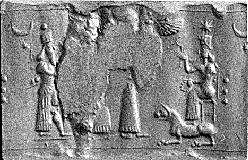 (Ninurta & his spouse Bau with her guard dog)
(Ninurta & his spouse Bau with her guard dog)
On its quilt (?), strewn with fresh herbs, mother Bau was resting comfortably with lord Nin-jirsu.
1203-1210 Large bronze plates (?) offered all sorts of food (?).
In the good house …… were cooked in shining bronze vessels (?).
Its pure bowls standing in the great dining-hall were troughs in various sizes that never lack water,
and the goblets beside them were the Tigris and Euphrates continually carrying abundance.
1211-1223 He had everything function as it should in his city.
Gudea had built the E-ninnu, made its powers perfect.
He brought fat and cream into its dairy and provided its …… with bread (?).
He had debts remitted and made all hands clear.
When his master entered the house, for seven days the slave woman was allowed to became equal
to her mistress and the slave was allowed to walk side by side with his master.
But the ritually unclean ones could sleep only at the border of his city.
He silenced the evil-speaking tongue and locked up evil.
1224-1231 He paid attention to the justice of Nance and Nin-jirsu.
He provided protection for the orphan against the rich,
and provided protection for the widow against the powerful.
He had the daughter become the heir in the families without a son.
A day of justice dawned for him.
He set his foot on the neck of evil ones and malcontents.
1232-1247 Like Utu, he rose on the horizon for the city.
He wound (?) a turban (?) on his head.
He made himself known by the eyes of holy An.
He entered the shrine of E-ninnu with raised head like a bull and sacrificed there faultless oxen and kids.
He set bowls in the open air and filled them full with wine.
Ucumgal-kalama (unidentified?) was accompanied by tigi drums, and ala drums roared for him like storm.
The ruler stepped onto the outer wall (?) and his city looked up to him in admiration.
(6 lines missing)
1254-1257 …… made abundance come forth for him.
The earth produced mottled barley for him.
Lagac thrived in abundance with the ruler.
1258-1263 For the warrior who entered his new house, for Nin-jirsu, he arranged a rich banquet.
He seated An at the place of honor for him, he seated Enlil next to An (Anu)
and Nin-mah (Ninhursag) next to Enlil.
(13 lines missing or unclear)
1276-1284 Rejoicing over the the house, the owner determined a fate for the brickwork of E-ninnu:
´O brickwork of E-ninnu, let there be a good fate determined,
brickwork of E-ninnu, let there be a fate determined,
brickwork of E-ninnu, let there be a good fate determined!
House! Mountain founded by An, built in grandeur!´
(16 lines missing)
1301-1305…… determined a fate for the brickwork of E-ninnu:
´O brickwork of E-ninnu, let there be a fate determined,
brickwork of E-ninnu, let there be a good fate determined!
House …… embers (?) …… embracing heaven.
…… holy …….´
(15 lines missing or unclear)
1321-1325 ´On your behalf, numerous cow-pens will be erected and many sheepfolds be renewed!
The people will lie down in safe pastures, enjoying abundance under you.
The eyes of Sumer and all the countries will be directed toward you.
An will elevate your house of Anzud for you.´
(14 lines missing or unclear)
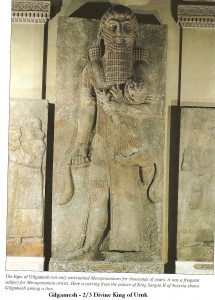
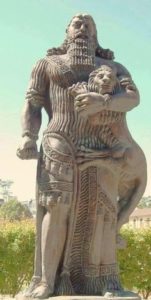 (ancient Gilgamesh relief; modern Gilgamesh statue, brother to Gudea)
(ancient Gilgamesh relief; modern Gilgamesh statue, brother to Gudea)
1340-1354 ´Grown as tall as Gilgamec (Gilgamesh).
No one shall remove its throne set up there.
Your god Nin-jiczida (Ningishzidda) is the grandson of An;
 (Ninsun, goddess mother to Gilgamesh, Gudea, & many others)
(Ninsun, goddess mother to Gilgamesh, Gudea, & many others)
your divine mother is Ninsun, the bearing mother of good offspring,
who loves her offspring; you are a child born by the true cow.
You are a true youth made to rise over the land of Lagac by Nin-jirsu;
your name is established from below to above.
Gudea, nobody …… what you say.
You are …… a man known to An.
You are a true ruler, for whom the house has determined a good fate.
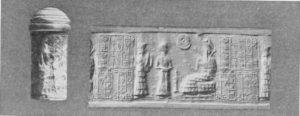 (Ninsun, her son-king Gudea, & Ningishzidda)
(Ninsun, her son-king Gudea, & Ningishzidda)
Gudea, son of Nin-jiczida, you will enjoy a long life!´
1355-1361 The house reaches up to heaven like a huge mountain
and its fearsomeness and awesome radiance have settled upon the land.
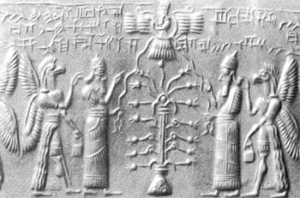 (Enki, Anu in his sky-disc, & Enlil, winged Apkulla pilots on each end)
(Enki, Anu in his sky-disc, & Enlil, winged Apkulla pilots on each end)
An and Enlil have determined the fate of Lagac;
Nin-jirsu´s authority has become known to all the countries;
E-ninnu has grown so high as to fill the space between the heaven and the earth.
Nin-jirsu be praised!’
”The building of Nin-jirsu´s house”.
This is the end of the hymn
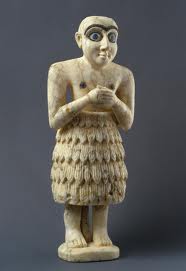
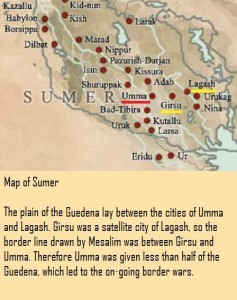
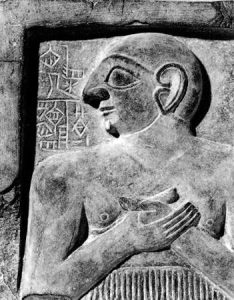
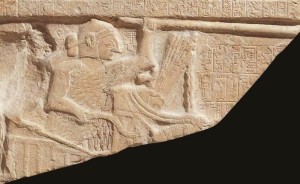
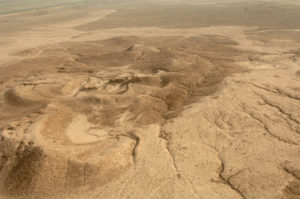
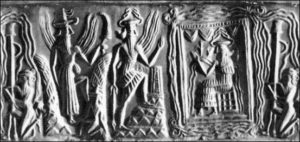
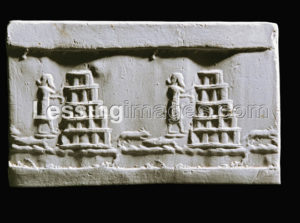
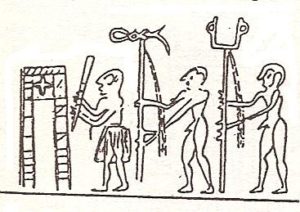
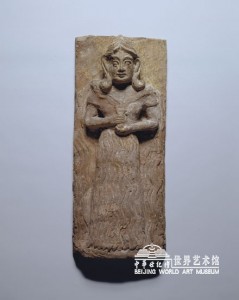
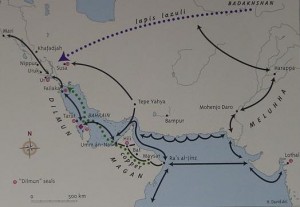
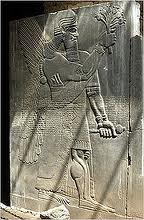
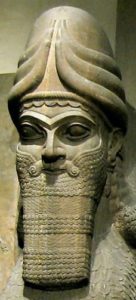
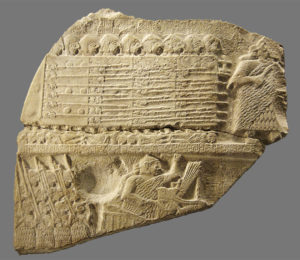
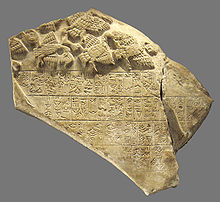
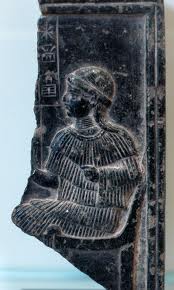

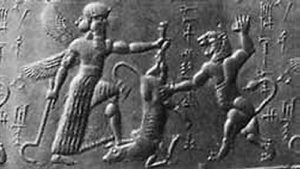
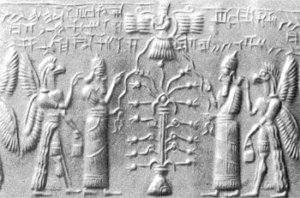
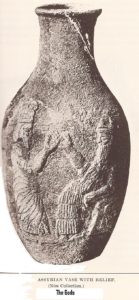
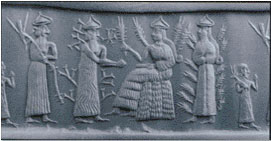
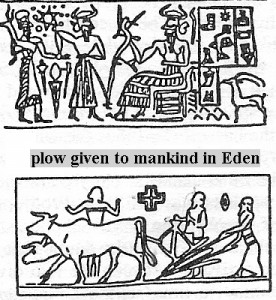
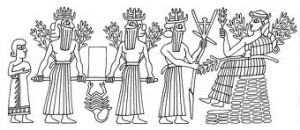
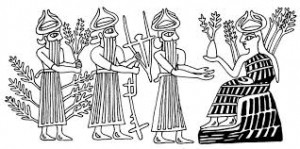
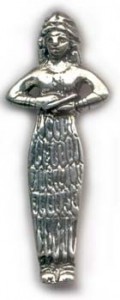

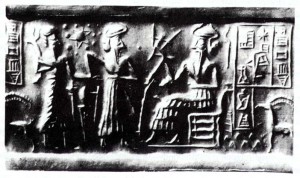
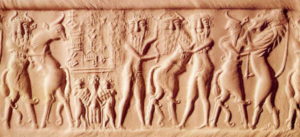
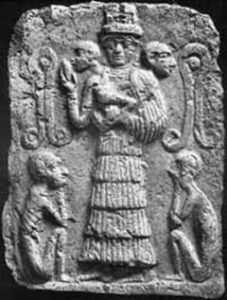
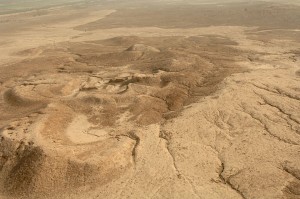
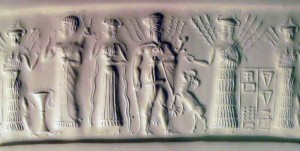
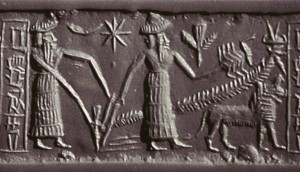
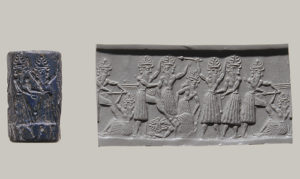
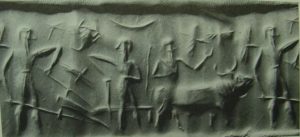
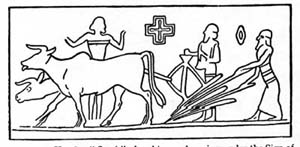
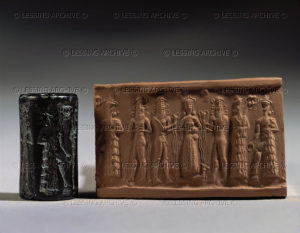
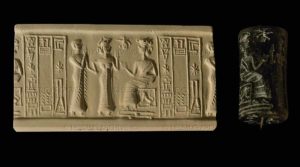
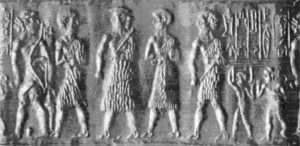

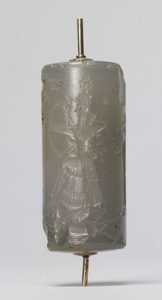
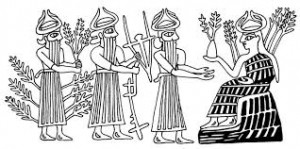
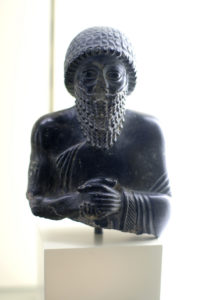
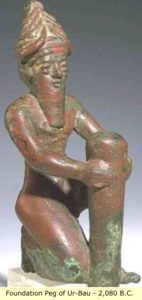
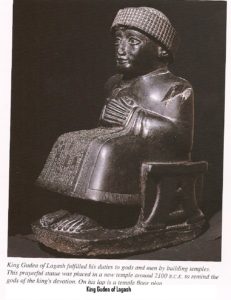
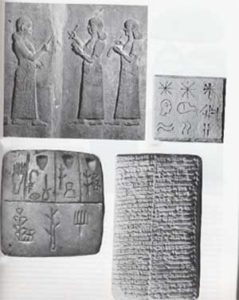
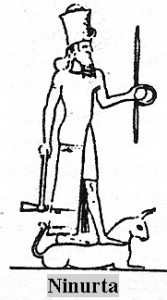
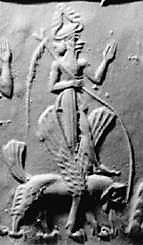
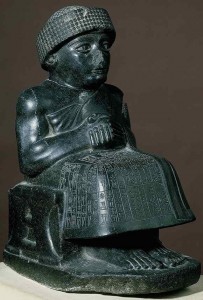
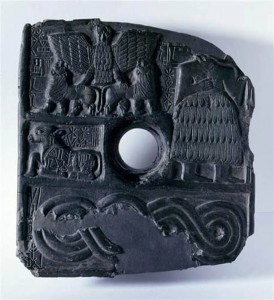











































































 (
(












